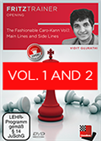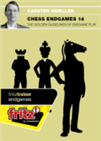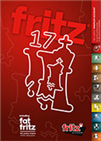Reinderman starts strong
Since 2009, a yearly ten-player chess tournament takes place at Café Batavia 1920, a comfy coffeehouse located close to Amsterdam's central station. The first ten editions were regular single round robins, while in 2019 the organizers decided to put forth an innovative format, with each round consisting of a classical game and a couple of blitz encounters (each match-up awarded a total of two points). This year the event has returned to its usual format, offering six Dutch players a chance to face international opposition from Germany, Poland, England and Indonesia.
Three grandmasters are in the mix — Dimitri Reinderman and Friso Nijboer from the Netherlands and Tomasz Warakomski from Poland — giving the remaining seven contestants a chance to get a GM norm. Besides Warakomski, Aljoscha Feuerstack (Germany), Lawrence Trent (England) and Irine Karisma Sukhandar (Indonesia) are the international representatives.
The rate of play is 40 moves in 90 minutes plus 30 minutes for all remaining moves, with 30 seconds per move added from the start.

A Hand & Brain tournament took place during the opening ceremony — Peter Doggers and Lawrence Trent teamed up for the competition | Photo: Lennart Ootes
Top seed Dimitri Reinderman kicked off the tournament with four straight wins. Coincidentally, his victories in rounds three and four were both scored after his rivals went all in for an attack with the white pieces. First, Manuel Bosboom gave up an exchange to open up the h-file and shortly after found himself looking for desperate measures to compensate for his material disadvantage:
 The aim of these Dvd's is to build a repertoire after 1.c4 and 2.g3 for White. The first DVD includes the systems 1...e5, the Dutch and Indian setups. The second DVD includes the systems with 1...c5, 1...c6 and 1...e6.
The aim of these Dvd's is to build a repertoire after 1.c4 and 2.g3 for White. The first DVD includes the systems 1...e5, the Dutch and Indian setups. The second DVD includes the systems with 1...c5, 1...c6 and 1...e6.
White has a lost position and needs to do something quickly if the wants to somehow muddy the waters. Bosboom went for 27.♘e6, when after 27...fxe6 28.dxe6 ♚h8 29.♗xe4 ♛g7 30.♖xf3 Black has 30...♛g2+ (see diagram below) and Reinderman will soon be a whole rook up. Resignation came five moves later.
Similarly, in round four Irine Sukandar desperately sacrificed her rook on g7 as a last-ditch attempt to save the game against Reinderman, but to no avail. The Dutch grandmaster won his fourth in a row after merely 29 moves. Replay both games in the viewer below.

Dimitri Reinderman | Photo: Lennart Ootes
Two players are sharing second place a full point behind Reinderman — Tomasz Warakonski and Nico Zwirs. Two of Warakomski's wins followed sharp tactical struggles. The Polish grandmaster needed 32 moves to defeat the ever-adventurous Bosboom in round one, while Edwin van Haastert failed to correctly assess the consequences of opening the h-file during round four:
 The Caro Kann is a very tricky opening. Black’s play is based on controlling and fighting for key light squares. It is a line which was very fashionable in late 90s and early 2000s due to the successes of greats like Karpov, Anand, Dreev etc. Recently due to strong engines lot of key developments have been made and some new lines have been introduced, while others have been refuted altogether. I have analyzed the new trends carefully and found some new ideas for Black.
The Caro Kann is a very tricky opening. Black’s play is based on controlling and fighting for key light squares. It is a line which was very fashionable in late 90s and early 2000s due to the successes of greats like Karpov, Anand, Dreev etc. Recently due to strong engines lot of key developments have been made and some new lines have been introduced, while others have been refuted altogether. I have analyzed the new trends carefully and found some new ideas for Black.
Van Haastert's decision to continue with 28.♗xh4 gave Black attacking chances along the h-file. There followed 28...♞xg4 29.♗xe7 ♛xe7 and the deciding mistake 30.♕g3:
There is no defence against Warakomski's 30...♜h1+. White tried 31.♔xh1 ♛h6+ 32.♕h3, but this fails against the simple fork 32...♞f2+. Resignation came after 33.♔g1 ♞xh3+.
Click or tap an entry on the list to switch between games

Tomasz Warakomski | Photo: Lennart Ootes
Much like Warakomski, Zwirs collected 3½ points after getting three wins, one loss and one draw, but the Dutchman's victories were rather technical efforts. For example, against Lawrence Trent in round four, Zwirs got the win from a materially balanced endgame. Trent's knight looked miserable on the corner though:
 Rules of thumb are the key to everything when you are having to set the correct course in a complex endgame. In this final DVD of his series on the endgame, our endgame specialist introduces you to the most important of these rules of thumb.
Rules of thumb are the key to everything when you are having to set the correct course in a complex endgame. In this final DVD of his series on the endgame, our endgame specialist introduces you to the most important of these rules of thumb.
Black played the natural-looking 37...♚d6, running to defend the backward b-pawn, when he needed to look for immediate counterplay on the kingside with 37...g5. After the text, the game continued 38.♔b5 ♚c7 39.♗e6 (controlling the kingside) ♚b7 40.c4 g5 41.♗f5 ♞f7 and White was ready for 42.c5:
Black went for 42...♞d8 and resigned after 43.cxb6, as a zugzwang position will soon emerge — for example, 43...a4 44.♗d7 and Black cannot move the knight due to 44.♗c6+ next. In the diagrammed position, after 42...bxc5 White has 43.♗g6, creating a passer on the other flank of the board.

Nico Zwirs | Photo: Lennart Ootes
Standings after Round 5
 The most popular chess program offers you everything you will need as a dedicated chess enthusiast, with innovative training methods for amateurs and professionals alike.
The most popular chess program offers you everything you will need as a dedicated chess enthusiast, with innovative training methods for amateurs and professionals alike.
All games
Links
























